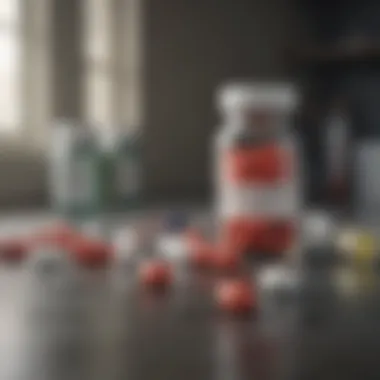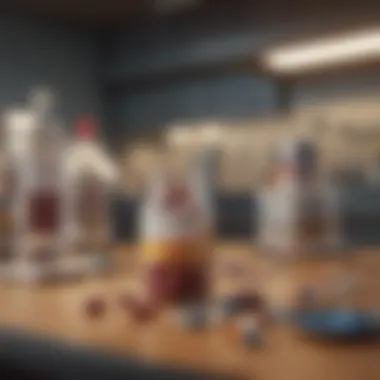Eliquis Patent Expiration: Market Impact and Future Insights


Intro
The expiration of the Eliquis patent marks a crucial juncture in the pharmaceutical landscape. Eliquis, a widely used anticoagulant, has reduced the risk of stroke and blood clots for many patients. However, with its patent coming to an end, a paradigm shift is poised to occur. The implications extend beyond just the drug's market performance; they touch on patient access to alternatives, generics, and the financial landscape for investors. Understanding this situation is vital for those involved in the healthcare sector and for investors looking at the pharmaceutical industry.
Market Overview
The expiration of the Eliquis patent introduces a competitive element in an already complex market.
Current Market Trends
Currently, the market is seeing a gradual emergence of generic versions of Eliquis. As these generics enter the market, they are likely to lead to a decrease in prices. This typically results in increased accessibility for patients. Market dynamics shift as large pharmaceutical companies compete against generic manufacturers, focusing on pricing strategies and product differentiation.
Key Market Indices Performance
In relation to the healthcare sector, key market indices have shown mixed performance in recent months. Investors should closely monitor indices such as the S&P 500 Health Care Sector Index. This can provide insights into how broader market sentiments react to patent expirations and competitive entries.
Economic Factors Influencing the Market
Economic factors such as regulation changes, healthcare policies, and reimbursement models play significant roles. Changes in government policies could affect how generics are prescribed and reimbursed by insurance providers. Furthermore, economic climates impact consumer spending and access to medications.
Sector Spotlight: Leading Sectors Affected by Trend
The pharmaceutical sector and the biotechnology field will feel the most substantial effects. Special attention should be given to companies focusing on anticoagulation therapies. Many firms are now considering how they can innovate or differentiate their offerings in this evolving market.
Stocks in Focus
High-Performance Stocks: Analysis and Recommendations
Several stocks in the healthcare sector have demonstrated resilience in the face of patent expirations. Companies like Pfizer and Bristol-Meyers Squibb continue to be pivotal players. Investors may consider analyzing their stock performance trends closely.
Undervalued Stocks: Opportunities for Investment
Often, stocks that seem undervalued during such transitions can present solid investment opportunities. Companies dedicating resources toward the development of new anticoagulants or improving existing treatment methods should be on the radar.
Emergent Stocks: Innovations and Market Entry
Startups and smaller biotech firms focused on niche anticoagulation products may also emerge as significant contenders. As they enter the market, they could offer innovative alternatives that cater to specific patient needs, creating new opportunities for investors.
Investment Strategies
Navigating the waters of investment requires specific strategies, especially during transformative times like this.
Short-Term vs Long-Term Investment Approaches
Investors must choose between short-term and long-term strategies. Short-term traders may seek to capitalize on immediate price fluctuations post-expiration, while long-term investors should assess the potential growth of generic competitors.
Risk Management Techniques
Risk management becomes crucial when the market dynamics shift. Diversifying investment holdings and setting stop-loss orders can mitigate potential losses stemming from increased volatility.
Diversification: Building a Balanced Portfolio
Investors should aim for a balanced portfolio that includes both established companies and newer entrants in the market. This could reduce risks while providing opportunities for significant returns.
Value Investing vs Growth Investing
Growth investors might seek out emerging companies in the anticoagulant space, while value investors could be interested in established firms that may see temporary declines in stock prices, yet retain robust fundamentals.
Tools & Resources for Investors
Interactive Stock Charts and Tools
Many online platforms offer interactive stock charts. These tools allow investors to visualize trends, helping to identify potential entry or exit points.
Calculators: Investment, Retirement, and Profit
Investment calculators are essential for understanding how much to invest and what returns to expect over time. Tools for retirement planning can also be useful during major shifts in the market.


Educational Resources: Articles, and Tutorials
Educational articles and tutorials provide insights that can enhance investment strategies. Sources such as Britannica and Wikipedia can offer background information on relevant topics.
Market Analysis Reports: What to Look For
Investors should focus on reports that detail market conditions and predictions. These analyses may highlight specific stocks or sectors to watch.
Personalized Investment Planning
Assessing Personal Financial Goals
It is important to define personal financial goals before investing. Understanding risk tolerance and investment horizon should guide decision-making.
Creating a Tailored Investment Strategy
A well-crafted strategy tailored to individual needs can yield better results. Consideration of the upcoming changes in the Eliquis market will be vital in this strategy formulation.
Regular Portfolio Reviews
Portfolio review should be a periodic practice. Regular assessments allow for adjustments based on how the market responds to the patent expiration and its effects on stock prices.
Consulting Services: When to Seek Professional Help
Reaching out to investment professionals can enhance decision-making. They provide insights that take into account much broader market trends and specifics about individual stocks.
The expiration of a significant patent like Eliquis can drastically reshape the competitive landscape in the pharmaceutical industry, directly impacting patient access and investment opportunities. Understanding these dynamics is essential for navigating this new environment.
Prologue to Eliquis
Eliquis is a notable anticoagulant medication that has had a substantial impact on the healthcare industry. Understanding Eliquis's role is essential, especially as its patent expiration approaches. This section lays the foundation of knowledge regarding this medication, examining its significance in anticoagulant therapies and the wider pharmaceutical landscape.
What is Eliquis?
Eliquis, generically known as apixaban, is an anticoagulant drug manufactured by Bristol-Myers Squibb and Pfizer. It primarily aims to reduce the risk of strokes and blood clots in individuals with conditions such as atrial fibrillation and deep vein thrombosis. Since its approval by the US Food and Drug Administration in 2012, Eliquis has gained popularity among healthcare providers due to its effectiveness and relatively safe profile compared to traditional anticoagulants.
The medication belongs to a class of drugs called direct oral anticoagulants (DOACs), which are characterized by their rapid onset of action and predictable pharmacokinetics. Eliquis is an important addition to the options available for patients who need anticoagulation therapy, offering a balance of efficacy and safety. Furthermore, the ease of use, with no requirement for routine monitoring, has contributed to its widespread adoption by both healthcare professionals and patients alike.
Mechanism of Action
Eliquis works by specifically inhibiting Factor Xa, a crucial enzyme in the clotting cascade. By blocking this enzyme, it effectively reduces the conversion of prothrombin to thrombin, subsequently decreasing the formation of fibrin and, ultimately, blood clots.
Here’s how it functions in simple terms:
- Inhibition of Factor Xa: Eliquis binds to the active site of Factor Xa, preventing it from participating in the clotting process.
- Reduction of Thrombin Formation: By inhibiting Factor Xa, the medication reduces thrombin levels, which is essential for clot formation.
- Decreased Clot Formation: Lower thrombin levels lead to reduced fibrin production, minimizing the risk of clot-related complications.
This mechanism underscores why Eliquis is effective in preventing strokes in patients with atrial fibrillation and managing venous thromboembolism. Its ability to act quickly and effectively while maintaining a good safety profile has made it an attractive choice among anticoagulants.
Understanding Patents in Pharmaceuticals
The landscape of pharmaceuticals is deeply intertwined with patent law. Understanding patents in this sector is crucial as it governs the innovation, manufacturing, and distribution of drugs like Eliquis. The expiration of such patents can trigger significant ramifications, impacting not only the pharmaceutical companies but also investors, patients, and the overall healthcare system.
The Role of Patents
Patents are legal protections that grant the inventors exclusive rights to their creations for a specific period. In pharmaceuticals, patents are essential because they incentivize companies to invest in research and development. Developing new drugs can take years and requires substantial financial resources. By securing patent protection, companies can ensure they recoup their investments through sales during the exclusivity period.
The expiration of a patent opens the market to competition from generic manufacturers. This often results in lower prices for consumers, expanding access to essential medications. Patents serve as a double-edged sword; they protect innovation while also eventually allowing for broader accessibility.
Insight: The balance between encouraging innovation and ensuring access is fundamental in the dialogue around pharmaceutical patents.
Types of Pharmaceutical Patents
Pharmaceutical patents are not monolithic; they come in various forms that cater to different aspects of drug development. The principal types are:
- Compound Patents: These protect the chemical composition of the drug itself. For instance, the patent for Eliquis covers its formulation as a specific anticoagulant.
- Formulation Patents: These pertain to specific formulations of the drug, which can involve the method of delivery or the type of excipients used.
- Use Patents: These cover new therapeutic uses for known compounds. For example, if a company discovers an existing drug can treat another condition, they may file for a new patent on that use.
- Process Patents: These protect the methods used to manufacture a drug. Innovations in production can lead to significant cost reductions or improvements in safety.
Understanding these different patent types is vital for stakeholders. It informs their strategies regarding investments, market entries, and legal considerations after patent expiration.
Eliquis Patent Details


The expiration of a pharmaceutical patent is a critical event that resonates across the healthcare sector. Understanding the details surrounding the Eliquis patent sheds light on various significant dynamics within the market. The implications are not only limited to the stakeholders involved but extend to patients, healthcare providers, and investors. A clear grasp of this subject will enable stakeholders to navigate the changes that arise from the patent expiration effectively.
Filing and Approval Timeline
The journey of Eliquis began with a comprehensive filing process. Initially submitted to regulatory authorities, the process involved rigorous examinations to ensure the drug's efficacy and safety. The approval timeline is notable as it reveals the extensive research and testing that precedes a medication's launch into the market.
- 2011: Eliquis was developed by Bristol-Myers Squibb and Pfizer, and the FDA initially filed for approval.
- 2012: The drug was approved for the prevention of stroke and blood clots in patients with non-valvular atrial fibrillation.
- 2014: Eliquis received additional approvals for other indications, expanding its therapeutic use.
These milestones reflect Eliquis's significant role in anticoagulant therapy, underscoring the importance of both pre and post-approval activities. The approval timeline is critical for understanding how market entry is managed in the pharmaceutical industry. Such insights provide investors with a perspective on potential growth trajectories following patent expiration.
Expiration Date of Eliquis Patent
The expiration date for the Eliquis patent is a pivotal element in the assessment of market impacts. This date marks the end of the exclusivity period for Bristol-Myers Squibb and Pfizer, opening the door for generic competition. The anticipated expiration date is set for 2026, after which generic manufacturers will be able to produce their versions of the drug.
- With the patent expiration, generic alternatives will likely enter the market.
- The competitive landscape may shift as prices could decrease due to the presence of multiple options.
- Patients may enjoy broader access to anticoagulant therapies at potentially lower costs.
Understanding the timing and ramifications of the Eliquis patent's expiration date is essential. It allows investors and stakeholders to forecast the changes in sales volume, market share, and pricing dynamics in the healthcare sector. The competitive landscape will evolve as new players enter the field, and this is a critical aspect for both investors and patients relying on these medications.
In summary, the Eliquis patent details not only clarify the timeline of the drug's approval but also emphasize its importance as a market player post-expiration. Stakeholders should remain aware of these dynamics to better prepare for the changing landscape in anticoagulant therapies.
Market Dynamics Post-Patent Expiration
The expiration of the Eliquis patent marks a pivotal moment in the pharmaceutical sector. Understanding this phase is essential for various stakeholders, including investors, healthcare providers, and patients. Market dynamics post-patent expiration will significantly influence competition, pricing strategies, and overall access to life-saving medications.
Impact on Generic Drug Manufacturers
The arrival of generic drug manufacturers is one of the most immediate effects of a patent expiration. Once Eliquis’s patent is no longer enforceable, companies like Teva Pharmaceuticals and Mylan will likely enter the market with their versions. The presence of these alternatives can drive prices down. In specific, this increase in market supply can lead to a more competitive landscape, enhancing affordability for patients.
"The entry of generics can lead to price drops of 30% or more for the brand-name drug."
Moreover, generic competitors can capture substantial market share quickly, often appealing to consumers looking for cost-efficient options. It is crucial for these manufacturers to navigate regulatory processes efficiently to ensure their products meet safety and efficacy standards.
Effect on Eliquis Market Share
The market share of Eliquis will likely see a notable decline after its patent expiration. Currently, Eliquis has a significant foothold in the anticoagulant market, but the introduction of generics will alter this landscape. As generics offer similar therapeutic effects at a reduced price, patients and healthcare providers may increasingly lean towards these alternatives.
Factors influencing Eliquis's market share shift include:
- Consumer Preferences: Patients may prefer a generic due to cost savings, impacting prescription patterns.
- Insurance Coverage: Insurance companies might incentivize the use of generic options through lower copays.
- Doctor Recommendations: Physicians may adapt their prescribing behaviors in favor of generics that provide equivalent efficacy and safety.
In summary, the dynamics of the market following the patent expiration of Eliquis will foster a more competitive environment with pronounced implications for both generic and brand-name strategies. Investors must pay attention to these shifts as they can indicate broader trends in the pharmaceutical sector.
Investor Considerations
The expiration of the Eliquis patent poses crucial implications for investors. Understanding these aspecs can help investors navigate the shifting landscapes of the pharmaceutical market. Investors must consider how patent expirations influence market dynamics, stock performance, and potential opportunities for profit. This section delves into two major elements: stock performance predictions and strategies for investors.
Stock Performance Predictions
When a patent expires, it usually triggers a transformation in stock prices, especially for the original brand manufacturer. Eliquis, developed by Bristol-Myers Squibb and Pfizer, has been a leading anticoagulant in the healthcare sector. However, the impending influx of generic alternatives will likely create downward pressure on its price and market valuation.
Financial analysts predict that following the patent expiration, Eliquis will lose market share as generics become available. This could result in a significant dip in stock prices for Bristol-Myers Squibb and Pfizer. While short-term volatility is expected, long-term trends could depend on how well these companies adapt to increased competition.
"Investors should monitor stock performance closely. Generic competition often prompts reactions that can be leveraged for strategic advantage."
Key factors influencing stock performance include:
- Market Share Loss: Anticipated decrease in revenue as generics enter the market.
- Investor Sentiment: News regarding generic approvals can influence stock price movements.
- Competitive Positioning: Companies that innovate or diversify their product lines may fare better.
Strategies for Investors
With the knowledge of impending market changes, investors can adopt various strategies to mitigate risks and capitalize on opportunities. Here are a few options:
- Diversify Investments: Consider investing in multiple pharmaceutical companies. This reduces reliance on a single stock and spread risk across various assets.
- Monitor Generic Entries: Timing is critical. By keeping an eye on launch dates for generic alternatives, investors can better predict stock performance volatility.
- Focus on Growth Stocks: Some companies will thrive post-patent expiration through innovation, expansion, or adjustments in their portfolio. Identifying these can yield significant returns.
Careful analysis and strategic planning are essential for any investor looking to navigate the treacherous waters of a patent expiration. Keeping abreast of market conditions and having a strong grounding in the pharmaceutical landscape will serve as an asset in making informed investment decisions.
Patient Access to Alternatives


Patient access to alternatives becomes a critical topic following the expiration of the Eliquis patent. As markets shift and new competitors enter, understanding how patients benefit from these developments is paramount. This section will explore the availability of generic alternatives and pricing dynamics, both of which affect patient options, and thus their overall health outcomes.
Availability of Generic Alternatives
When a patent expires, generic versions of the medication can enter the market. For Eliquis, which is widely prescribed for conditions like atrial fibrillation and prevention of blood clots, the introduction of generics means significant changes. Generic versions must meet equivalent standards for efficacy and safety, which assures patients they can expect similar outcomes. The key benefit is that they often come at a lower price, making essential treatments accessible to a larger population.
Several major pharmaceutical companies are gearing up to release generic versions of Eliquis. This may include firms like Teva and Amgen, known for their capacities in producing high-quality generics. As these companies begin to roll out products, patients might have more options than before. Increased competition among these alternatives can further drive down costs, providing important financial relief for those who rely on anticoagulant therapy.
Pricing Dynamics in the Market
The dynamics of drug pricing post-patent expiration play a significant role in patient access to alternatives. As generics emerge, the price of Eliquis is expected to experience fluctuations. Once generics are available, the original brand's price may drop as manufacturers strive to maintain market share. This can benefit patients through price reductions and expanded access.
The pricing characteristics can be influenced by various factors:
- Market Competition: Increased competition typically leads to lower prices. If multiple generic versions of Eliquis are available, patients can benefit from price wars.
- Insurance Coverage: Different insurance plans may cover generics at a higher percentage, further reducing out-of-pocket costs for patients.
- Regulatory Factors: Regulatory bodies may implement pricing controls or caps to ensure that essential medications remain affordable.
This evolving landscape ultimately highlights the importance of understanding the mechanisms that enable access to vital medications. As patient needs continue to be prioritized, the ramifications of Eliquis's patent expiration will likely yield both opportunities and challenges in equitable healthcare access.
In summary, the expiration of the Eliquis patent not only opens the door for generic competition but also fosters market dynamics that can lead to better patient access and affordability. Understanding these factors is crucial for patients and healthcare providers alike.
Legal Landscape Around Patents
The legal landscape surrounding pharmaceutical patents is a complex and crucial aspect of the industry. Its intricacies play a significant role in determining how drugs such as Eliquis continue to be positioned in the market. Understanding this legal environment offers insights into the various challenges that generic manufacturers face and highlights the implications for the entire healthcare sector.
Key elements that are vital in this context include:
- The framework of patent law, which provides exclusive rights to pharmaceutical companies for a period.
- The process through which these rights can be challenged, either by generic manufacturers or other stakeholders.
Benefits and considerations regarding the legal landscape are manifold. Firstly, it establishes a balance between incentivizing innovation and allowing competition once patents expire. Furthermore, it is essential to comprehend the litigation risks that may arise as generic companies attempt to enter the market, especially for successful brand-name drugs like Eliquis.
Understanding the legal framework can empower investors to make informed decisions based on potential market movements as generics come into play.
Litigation Risks for Generic Manufacturers
Generic manufacturers often encounter significant litigation risks when trying to produce alternatives to brand-name drugs. This aspect is particularly relevant for drugs that have established strong market positions.
- Patent Infringement Claims: Brand-name companies frequently assert that generics infringe on their existing patents. This can lead to lawsuits that delay the launch of the generic version.
- Cost of Litigation: The financial burden associated with defending against patent infringement claims can be substantial. Many small or mid-sized generics may not withstand lengthy legal battles.
- Market Uncertainty: Ongoing litigation can create uncertainty in the market, impacting pricing strategies and the timing of product launches.
For instance, if a generic manufacturer successfully challenges a patent, it may trigger a wave of generic products entering the market, which significantly alters pricing dynamics and competitive landscapes.
Future Patent Challenges
The future of patent challenges is another important consideration in the pharmaceutical landscape, especially post-Eliquis. Multiple factors influence how this will unfold.
- Biosimilars and Next-Generation Products: As the industry evolves, new classes of medications may bear similarities to existing drugs, prompting novel patent challenges.
- Legislative Changes: Changes in patent laws, whether at the national or global level, can reshape the patent landscape, impacting both brand-name and generic drug manufacturers.
- Increased Scrutiny and Regulations: Regulatory bodies continue to monitor patents closely to prevent abuse. This can lead to more opportunities for generic manufacturers to challenge patents successfully.
Navigating future challenges will require astute legal strategies and awareness of evolving regulations. Both stakeholders in the pharmaceutical market and investors need to closely observe these developments as they can substantially impact market access and drug pricing strategies.
Epilogue
The conclusion is a powerful part of this article. It highlights the importance of understanding the expiration of Eliquis's patent and its ramifications. This topic is not just for pharmaceutical professionals; it holds significance for patients, investors, and even policymakers. The expiration marks a critical juncture in the healthcare landscape, influencing the availability of alternatives and pricing structures.
Key elements emerge from this discussion. First, there is a clear shift in the market dynamics. With new generic options, patients may gain better access to anticoagulant therapies. It is also about the financial landscape, where investors need to reassess their strategies. The insights offered paint a detailed picture of how a single event can ripple through various sectors, affecting clinical decisions and investment portfolios alike.
Benefits of understanding these implications are numerous. For patients, awareness leads to more informed choices regarding their health. For investors, the ability to navigate the shifting tides of the market can mean the difference between loss and gain.
Considering all this, the conclusion brings clarity to the surrounding complexities. It encapsulates the essence of the article while signaling the importance of ongoing vigilance in a rapidly evolving market.
Recap of Key Points
A review of the crucial points covered in the article highlights several significant aspects:
- Eliquis Overview: Understanding what Eliquis is and its role as an anticoagulant therapy.
- Patent Dynamics: The details about patent types and their impact on drug availability.
- Market Changes: How the expiration affects generic manufacturers and market shares.
- Investor Actions: The strategies investors should consider moving forward.
- Patient Access: The availability and pricing implications of alternatives for those in need.
This recap gives a succinct summary of the core themes explored. It serves as a reminder of how interconnected the fields of pharmaceuticals, market strategy, and patient care are.
Future Outlook for Eliquis and the Market
Looking ahead, the future for Eliquis and the wider market is a subject of considerable interest. The expiration of Eliquis's patent sets the stage for a more competitive environment. As generics enter the fray, there will likely be a decrease in prices, benefiting consumers.
Anticipating new entrants to the market, established manufacturers may need to innovate. This may involve research into next-generation anticoagulation therapies or expanding their offerings in related treatments.
For investors, a more competitive landscape brings both risks and opportunities. Tracking emerging trends will be essential. Decisions need to consider not only the potential of generics but also the strategic responses from original manufacturers.
In summary, while the immediate impact of Eliquis's patent expiration may be observable, the long-term outcomes are likely to be complex. Stakeholders must remain engaged and informed to navigate the evolving landscape effectively.







